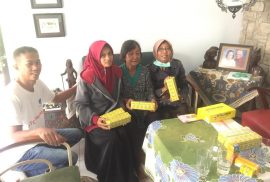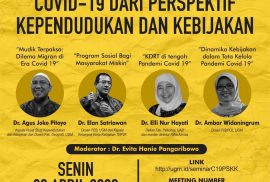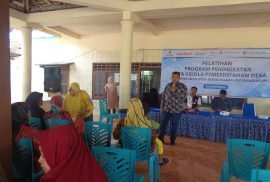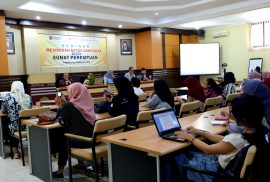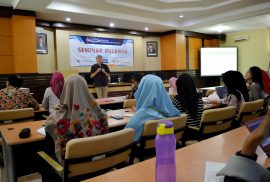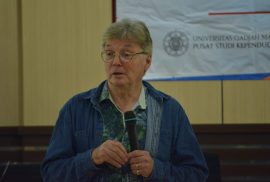Yogyakarta – Center for Population and Policy Studies (CPPS) UGM held a web seminar (webinar) titled “Scrutinizing Physical Distancing Policy on COVID-19” on Thursday, May 14, 2020 at 10.00-12.00 a.m.
The transmission pattern of COVID-19 following the exponential rate forces the public to implement physical distancing and even many countries then issued full lockdown or partial lockdown policy to reduce the trend of pandemic transmission. Indonesia started implementing large-scale social restriction (Pembatasan Sosial Berskala Besar/PSBB) policy from April 7, 2020.
Dr. Hakimul Ikwan, a lecturer at Faculty of Social and Political Sciences UGM and researcher at CPPS UGM said that all countries are currently affected by COVID-19, including the so-called most modern and ‘superior’ countries, such as America, but not all countries have experienced the downturn, e.g. Taiwan and Vietnam.
Even though the current situation (physical distancing) forces the community to be physically distant, the community should also not be emotionally distant because everyone is facing the same problem called COVID-19. However, according to him, there is a strong indication that there will be a growing division of emotional closeness in Indonesia.
Hakim highlighted that the downturn in America occurred, one of them is because of a loss of public trust (distrust) to the leaders of the country, e.g. there was an extraordinary political divide between supporters of the republic and democrats. Meanwhile, the opposite condition happened in Taiwan and Vietnam, which carried out a “remote smart” system. Taiwan did not even hesitate to cut its relationship with China despite their strong ties. The two countries had successfully learned from Hong Kong that did not open the data when the corona virus began to spread.
“Indonesia is currently standing on the brink of distrust because, in one hand, it has a pre-condition of America (disintegration), but on the other hand it does not have Taiwanese and Vietnamese anti-bodies (smartly distant). The government should learn from Taiwan and Vietnam and build public trust,” he said.
Based on the three main pillars of social and social welfare, such as state responsibility, mandatory contributions, and voluntary or voluntarism, Hakim marked that the remaining pillar that provides a ray of hope to prevent emotional divisions in society is the third pillar, voluntary (voluntarism) or social solidarity.
The results of the CPPS UGM survey (2020) conducted online showed that 80 percent of the community is willing to make donations in the form of basic necessities and 76.2 percent said they would donate in the form of money. 34.2 percent are willing to directly give the donation to recipients, 24.7 percent through institutions or third parties, 22.2 percent through online donations, 18.9 percent do not apply, and 22.2 percent said they would do online donation.Chairperson of MUI DIY at department of HR, culture, and art as well as lecturer at UIN Sunan Kalijaga, Dr. Tulus Mustofa explained that Islam is also taught to teach the importance of cultivating an attitude of solidarity in the face of a pandemic. “First of all, building solidarity is very important because whatever we design, as a people or nation, is difficult to achieve if the people or nation are not solid. An outbreak is not only seen as a disaster, but also the opportunity for charity to help others, as well as a part to keep the disaster away,” he said.
Policy Communications in the Era of COVID-19
A lecturer at Faculty of Social Sciences and Politics UGM and Head of Center for Southeast Asian Social Studies, Prof. Hermin Indah Wahyu explained that the novelty character of the corona virus makes the information environment uncertain, therefore the communication strategy must be very precise and intended to the right people as well.
“In the case of a pandemic, preventing the spread of escalation of transmission is an important keyword, so the choice of which method will be the success or failure of a country to get out of the struggle against the COVID-19,” she said.
The quality of public communication (in Indonesia) in the face of a pandemic, according to her, at least experiences several problems, such as, the exposure of strategies by relevant parties with no evidence-based policy, the interpenetration communication failure, and the absence of communication in a large scenario that become the basic strategy of the war against COVID-19.
Regarding the choice of intervention efforts to reduce the spread of the virus, the community needs to be invited to understand what is being faced as well as how the choice of strategies will contribute to reducing escalation. The role of epidemic experts is very important to provide a database that guides the government’s actions.
“However, what happened in Indonesia is we are shocked because of the unclear choice of policy directions. The epidemic experts should have a strong stage because they are experts. However, Indonesian epidemic experts do not even have a stage at all,” she added.
Meanwhile, the interpenetration communication failure is marked by the dominance of certain internal systems in responding to crises, such as COVID-19. “For example, corona in the transportation system filter, corona in the economic system filter, corona in the legal system filter,” she emphasized.
In addition, according to her, there is too much resonance or too many branches of issues that had been echoed by the stakeholders and all the systems expressed their views in accordance with the character of their internal system functions, so they were far from the main problem of the corona pandemic, i.e. health.
“Public discourse about PSBB is filtered by many systems, so it is difficult to avoid discourse conflicts that are very potential to occur,” she explained. Also, there is no communication in a large scenario that is the basic strategy against the corona virus, so it is difficult for the public to imagine what phase Indonesia is currently in (normal, critical, or sloping)?
“The latest data are updated by the Ministry of Health spokesperson every day, but what is meant by such information cannot be captured in the framework of macro strategies. Coordination by the president and staff, and the task force handling COVID-19 by BNPB has more or less the same color of information. Ideally, the president gives a more macro-substantive view of driving the coordination of various elements,” she said.
“A very fragmented portrait of policy communication is difficult to be able to imagine the big depiction like what is currently in the minds of the public: uncertain, equivocality,” she concluded.
Here is the link for the seminar material: download
Author: Nuraini Ika dan Nurul Widia | Language Editor: Rinta Alvionita | Photo: Ramlon (pixabay.com)






